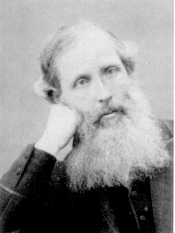| Profile | Major Works | Resources |
Henry Sidgwick, 1838-1900


English utilitarian philosopher and Classical economist at Cambridge University.
Henry Sidgwick was born in the year after Queen Victoria took the throne, and died six months before she died. It was a fateful coincidence; in many ways, Henry Sidgwick was the quintessential Victorian, the perfect 19th Century English academic.
Educated at Rugby, Sidgwick entered Trinity College, Cambridge, in 1855. Graduating in Classics and Mathematics in 1859, laden with prizes, Sidgwick was immediately elected Fellow of Trinity College, Cambridge. He was to remain a teacher at Trinity College until his death. (although he temporarily lost his fellowship in 1869 over his refusal to make a religious oath; he was re-elected in 1885).
Throughout the 1860s, he would undertake the study of philosophy, religious history and ethics. The outcome of his efforts was his famous Methods of Ethics (1874). Sidgwick was particularly influenced by the thought of John Stuart Mill. In this famous book, he attempted to reconcile Mill's utilitarian philosophy with the "intuitional" (i.e. "duty") theory of ethics. However, he recognized that one could not, a priori, reconcile either of these with the principle of self-interest. Sidgwick also proposed that the appropriate measure of social welfare was average utility multiplied by the size of the population. This solution was much applauded by Edgeworth (1877).
As a lecturer on Moral Sciences, economics fell partly under his purview, and here too, Sidgwick was also a follower of of John Stuart Mill. Sidgwick was a proponent of the Classical School of political economy just at the time when it was coming under its greatest assaults. Sidgwick fended off the critiques of the English Historicists, Sidgwick was also aware of the deficiencies of Wages Fund doctrine, but believed it could be salvaged with a little tweaking and flexibility. However, he never really grasped the significance of the Marginalist Revolution of 1871. He was prepared to accept Jevons's theory of marginal utility as "in the main true and as an important addition to the older theory, but I am not prepared to say that the modification thus introduced into the theory of value...is enough to make me regard Jevons's doctrine as a new basis." (Letter to Foxwell, November 1886). In his Principles (1883), Sidgwick was particularly keen on defending Mill from Jevons's assault (but not Ricardo, whom Sidgwick painstakingly distinguished from Mill). Sidgwick's textbook was attacked in reviews not only for being a relic of Classicism, but also for being all dry, abstract theory, with not enough application or policy. Nonetheless, Sidgwick was one of the first economists to recognize externalities as a source of market failure.
Henry Sidgwick was appointed Knightsbridge Professor of Moral Sciences at Cambridge in 1883. When Alfred Marshall was appointed as Professor of Political Economy in 1885 (succeeding Fawcett), Sidgwick initially tried to exercise his seniority on the Moral Sciences board to interfere in Marshall's economics curriculum, something Marshall vigorously resisted. Sidgwick, in turn, resisted Marshall's attempts to aggrandize the space for economics in the Moral Sciences Tripos. However fraught on paper, the personal relationship between Sidgwick and Marshall was nonetheless cordial and convivial, and sometimes characterized as a deep friendship. Sidgwick gradually abdicated his attempts to control economics, and gave Marshall the leeway to construct his Neoclassical school at Cambridge.
Sidgwick relished Cambridge and frequently participated in the university's administrative matters. He was a member of the "Apostles" the exclusive Cambridge discussion group and the Grote Club.
Like his hero Mill, Sidgwick was a promoter of women's education (if not quite outright equality). In 1871, he established a residence for women students at Cambridge, which, in 1879, finally became Newnham College in 1880. In 1876, Sidgwick married, Eleanor Mildred Balfour, the sister of Arthur J. Balfour, the future British Prime Minister (and ex-Sidgwick student). Eleanor herself became the second principal of Newnham. Interestingly, Mary Paley, Marshall's future wife, was one of the college's first students. Sidgwick's own sister was married to the Archbishop of Canterbury.
A final quirk: always a bit mystically-inclined, Sidgwick was one of the founders and first president (1882-85, 1888-93) of the Society for Psychical Research and a member of Metaphysical Society.
|
Major Works of Henry Sidgwick
|
|
HET
|
|
Resources on Henry Sidgwick Contemporary
Modern
|
All rights reserved, Gonšalo L. Fonseca
